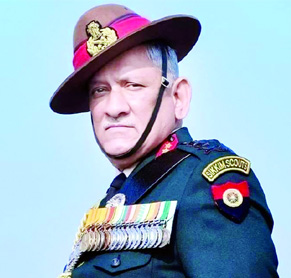Satish Singh Manhas
“It is foolish and wrong to mourn the men who died. Rather we should thank God that such men live” (George S Patton, Jr).
General Bipen Rawat was a four star General of the Indian army who served as 26th chief of the army and first chief of defence staff of the Indian armed forces from January 2020 until his death in a helicopter crash. He was a first in the “order of merit graduate” from the Indian Military Academy, Dehradun and was also a ‘Sword of Honour’ awardee. General Bipen Rawat was commissioned into the 5th battalion, the 11 Gorkha Rifles (5/11 GR) on 16 December 1978, the same unit as his father had retired from.
There are many firsts associated with his military career like as a young captain, General Bipen Rawat had successfully handled the Sino-Indian skirmishes of 1987, the first after 1962 war at Sumdorong Chu valley along the Mac Mohan line. He had spent ten years conducting counter-insurgency operations in different areas in different ranks. As a brigadier he had served successfully for a UN mission in Congo and is credited with bringing the CNDP and other armed groups on the negotiating table and played a commending role for the protection of the vulnerable population there. He is also credited with revenging the martyrdom of 18 Indian soldiers killed in an ambush by militants belonging to the United Liberation Front of Western South East Asia (UNLFW) in Manipur in June 2015 by responding with cross-border strikes by striking an NSCN-K base in Myanmar inflicting heavy casualties on the militants.
A daring and upright general habitual of calling “spade a spade” he backed up the action of his young major Leetul Gogoi in Kashmir insurgency and awarded a Chief of the Army Staff Commendation Card for his successful counter-insurgency operations. As a honour, on his visit to the United States in 2019, General Rawat was inducted to the United States Army Command and General Staff College International Hall of Fame. During his tenure, the 73 days Doklam military standoff was handled very effectively causing heavy loss to the Chinese army. He also advised the nation and its leadership to prepare for a two-front war situation any time in future against China and Pakistan. Academically, he was awarded a honorary doctorate by Choudhary Charan Singh university Meerut, for his research on military-media strategic studies, he had also obtained a MPhil degree in Defence Studies as well as diploma in Management and Computer Studies from the University of Madras in 2011.
But the entire nation got shocked over the tragic accident in which General Bipen Rawat the first chief of armed forces (COAS) along with his wife Smt. Madhulika Rawat, Brigadier Lakhwinder Singh Lidder and 11 other soldiers including the bodyguard commandos for the General lost their precious lives near Coonoor in Tamil Nadu on December 8th, 2021. The General along with his team was heading to address the faculty and trainee officers of the staff course at the defense services staff college (DSSC), Wellington, Nilgiri Hills. He along with the others flew in the morning from New Delhi in another chopper before boarding the Russian manufactured Mi-17V5.
This double engine chopper besides having an on board weather radar is also equipped with the latest generation night vision device. This double engine Chopper has the capability to fly if one engine stops working or if both engines stop working and even after that it can land as the parachute. But, Alas! What happened as none of these specialized features could help save our dynamic General, his wife and other martyr soldiers. What went wrong with the chopper that within 30 minutes of its take off and flying, such a tragedy struck our nation? If bad weather has been cited as the reason of accident initially and even in the findings of the high level tri services probe headed by air marshal Manvendera Singh which submitted its preliminary findings to Defense Minister Raj Nath Singh, ruling out any mechanical failure, sabotage or negligence then a question arises why the on board weather radar could not detect in advance the direction and intensity of bad weather/ wind/ clouds? Has any weather report for the flight not been issued? Or who decided to go with the flight if the forecast had indicated inclement weather? Could the pilot not make any distress call? Was the on board radar not working? If so then a question arises, was the chopper not ready before flying? If bad weather is the only reason.
Then all other guesses seem illogical. But definitely need a look. Because can the weather become too violent within a few minutes if there was no forecast. Now what is more important at this point of time is that we lost a great General along with a big team of officers which the nation cannot afford to lose under any circumstances in the future. Can such accidents be averted well in time in the future? This is what everybody wants to hear, although at times nature has its own unpredictable call.
Trending Now
E-Paper


